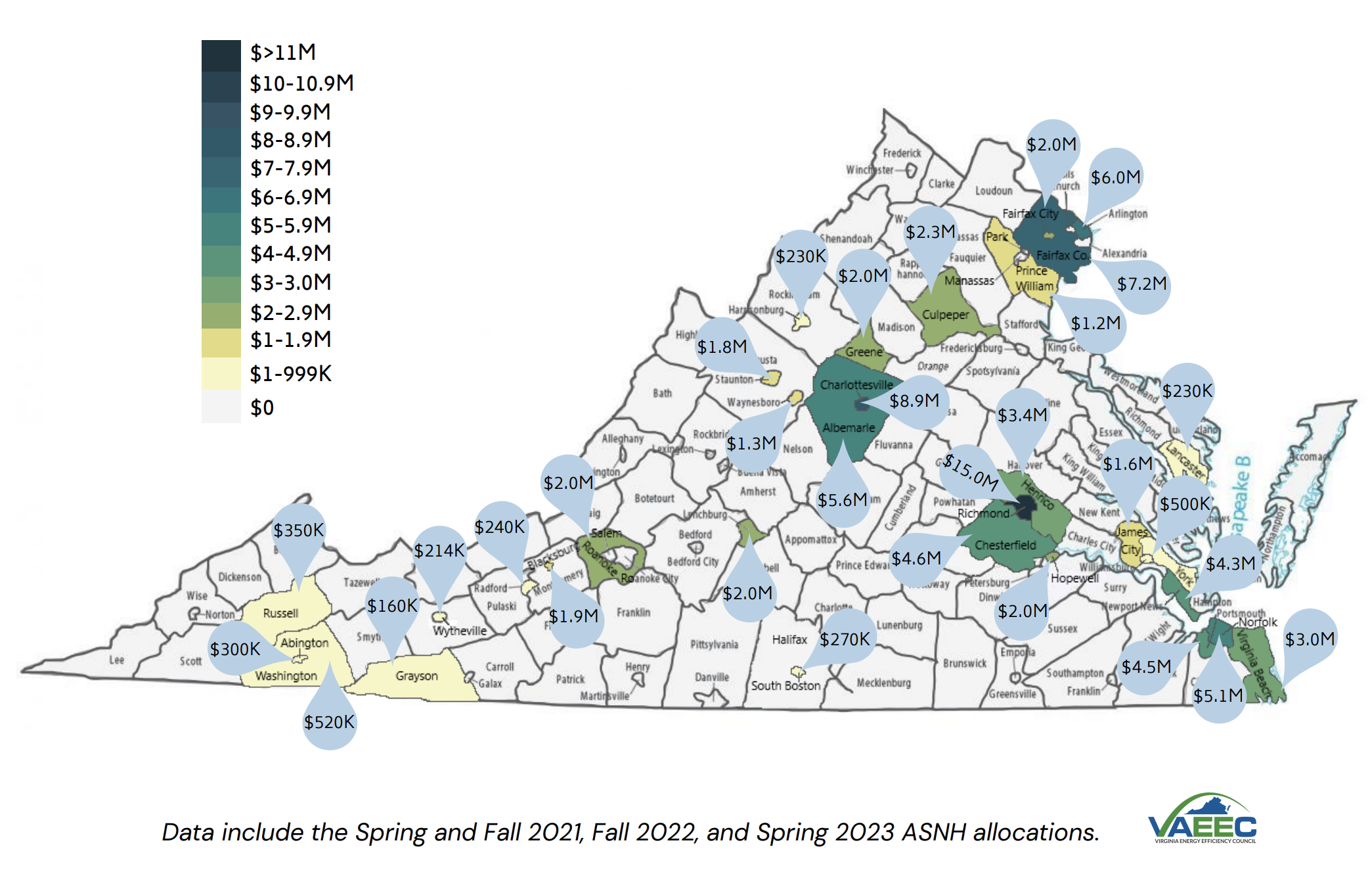Bill of the Day: RGGI Budget Battle
The Virginia General Assembly passed the Clean Energy and Community Flood Preparedness Act in 2020 which allowed Virginia to participate in the Regional Greenhouse Gas Initiative (RGGI). Virginia joined 10 other participating states in the successful cap-and-invest regional program that drives down carbon pollution while generating new revenue by charging utilities for their pollution.
RGGI revenue generated more than $827.7 million for Virginia between 2021 and 2023. By law, these funds are divided between two statewide programs, a low-income energy efficiency program and a flood resilience capacity building and project implementation program.
Despite massive reductions in pollution and millions of dollars in new revenue, Governor Youngkin withdrew Virginia from the program through an illegal administrative repeal of the RGGI regulation. Virginia’s contract with the RGGI program expired in December 2023, and the Commonwealth is now poised to miss out on approximately $300 million in annual revenues.
Budget Battle #1: Get Virginia Back in the Regional Greenhouse Gas Initiative
We can not allow the administration to circumvent the law and create a huge hole in the budget. Virginia must rejoin RGGI, and is poised to do so through a proposed budget amendment.
The Virginia House of Delegates added a budget amendment that requires the Commonwealth to rejoin RGGI and directs the appropriate state agencies to take the necessary actions to rejoin RGGI. Unfortunately, the Virginia Senate did not include this language. The House and Senate will need to reconcile their different budgets through the “conference” process. The conservation community is eager to see legislators adopt the House budget item in the final budget so the Commonwealth can remain in RGGI.
Virginia must rejoin RGGI because:
- RGGI is delivering cleaner air for Virginians. Carbon pollution is down 22% since Virginia started participating in RGGI.
- RGGI is already the law. The 2020 Clean Energy and Community Flood Preparedness Act already requires Virginia’s participation in RGGI.
- RGGI is bringing in hundreds of millions of dollars every year, helping Virginians all across the state. Low-income families are slashing their energy bills thanks to efficiency upgrades, and localities are finally able to address flooding issues. Losing this funding creates a massive hole in the budget.
Budget Battle #2: No Raiding RGGI Funds
RGGI has raised millions of dollars for critical funds that help Virginia’s families with energy bills and flood protection. By law, 50% of RGGI revenue should go to low-income energy efficiency programs, 45% to the Community Flood Preparedness Fund (CFPF), and 5% to administrative costs. The General Assembly must not redirect any RGGI funding away from these programs. In many cases, this is funding that localities have started to rely upon or plan to access. As Virginia’s participation in RGGI is currently on hold, these programs need existing funds to be maintained – not have their funding sources diluted and raided for other programs.
Community Flood Preparedness Fund

RGGI raised $372.5 million from 2021-2023 to enhance community flood prevention and protection. The Governor’s 2024–2026 budget allocated $100 million for the Community Flood Preparedness Fund. While needed, this does not fill the funding gap left by Virginia’s withdrawal from RGGI.
Without RGGI auction proceeds to bring in steady funding, which exceeded $130 million annually in 2022 and 2023, the CFPF will quickly be unable to meet the needs of Virginia’s localities which are desperately seeking reliable funding for flood mitigation planning and projects – unless state appropriators fill this gap. Virginia Conservation Network partners request $200 million of general funds over the biennium to backfill the lost RGGI revenue.
Housing Innovation Energy Efficiency Fund

RGGI raised $413.9 million from 2021-2023 for the Housing Innovation Energy Efficiency (HIEE) fund for energy efficiency upgrades to new and existing housing.
Some of these funds support the Weatherization Deferral Repair (WDR) program to address the backlog of major health and safety repairs for existing homes. These energy-efficiency upgrades include renovations like new roofs, HVAC replacements, mold remediation, and leak repairs that would otherwise go unresolved without RGGI funds. RGGI also supports the Affordable and Special Needs Housing (ASNH) program. This program ensures the most energy-efficient, affordable housing is available for Virginia’s most under-served communities.
General funds must be used to provide funding for other new programs instead of skimming money from RGGI. No matter how you slice it, the programs above cannot afford to lose any of their existing funding. Virginia should not chop up our RGGI funding into slivers for smaller, unrelated programs.
Take Action
The House and Senate budget proposals are going to a Conference Committee. This closed-door budget committee comprised of Senators and Delegates will consolidate the budget proposals for the Governor’s approval. The committee members, aka “conferees,” will play a huge part in finalizing the Fiscal Year 2024-2026 budget. The Budget Conferees are:
- Senator Lucas, Deeds, Locke, Boysko, McDougle, & Pillion
- Delegate Torian, Sickles, Bulova, Carr, Austin, & Bloxom
Ask legislators to support rejoining RGGI through the House budget amendment item 4-5.12 #1h.
